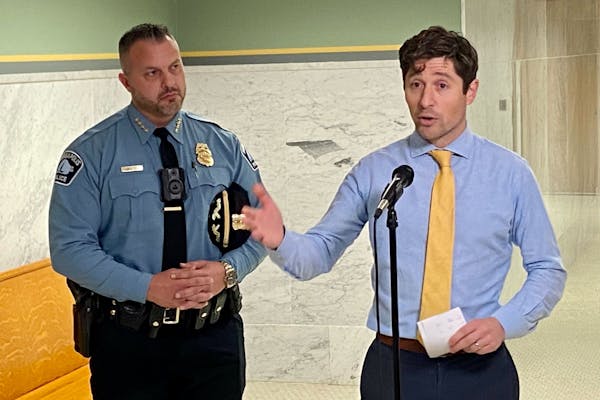The Minneapolis City Council approved an annual spending plan Tuesday evening that seeks to replenish both the manpower of the city's Police Department and the community's trust in public safety two years after the murder of George Floyd and the tumult that followed.
Encompassing nearly $1.7 billion in spending, the 2023 city budget will mean tax increases for the vast majority of property owners to pay for the city's ambitions as it seeks to define itself in the era following not just the reckoning after Floyd's killing, but also the coronavirus pandemic that hobbled large swaths of urban life.
The budget, the result of a proposal by Mayor Jacob Frey and amendments by the City Council, attempts to balance the demands for changes in how the city polices its streets amid demands for traditional police strength at a time when crime spiked and the ranks of officers shrank, largely through attrition.
It is also the city's first budget since the creation of the Office of Community Safety in October.
Police at full strength?
The budget includes more than $195 million for Minneapolis police — some $2 million more than in 2020.
The budget fully funds the 731 full-time officer positions required by longstanding minimum staffing requirements. That's not new, but the city has had difficulty filling those positions and is 118 officers short of that minimum.
Frey said his office has a plan, funded by the budget, to fill all those slots in 2023, although he acknowledged, "It will be hard."
Part of that plan involves funding to recruit new officers and funding for police academy classes to bring those recruits to sworn status.
Civilian response boosted
The new budget also incorporates some of the reforms demanded after the murder of Floyd by a Minneapolis police officer in 2020.
For example, the budget boosts funding for mental health response teams as part of a plan to roughly double their funding over two years.
Under that plan, each police precinct in the city could have a single team, equipped with a vehicle, able to respond to 911 calls involving someone experiencing a mental health crisis 24 hours a day. Unlike in previous iterations, these teams don't have armed police officers necessarily escorting them.
Similarly, the budget expands civilian presence in other areas traditionally manned by cops, such as unarmed traffic response teams that can investigate, say, an abandoned vehicle.
Frey said the budget was historic in that it codified these changes.
"We are creating a framework for generations to come," Frey said.
Underscoring the strains facing the city, at a hearing Tuesday night before the council's vote, both Black and white residents were among those who spoke in favor of restoring the ranks of police officers, and against it.
Council Member Robin Wonsley, who represents the Second Ward and sought several changes to Frey's initial proposal, praised parts of the budget that seek to increase police accountability and social justice initiatives, such as funds to install fire sprinklers at the remaining public housing high-rises in the city that lack them.
"I'm looking forward to hearing from residents and the community as to whether that was enough," Wonsley said before Tuesday's public hearing. She joined all 12 fellow council members in voting in favor of the final budget.
More budget highlights
Other notable increases in spending include:
- Nearly $13 million to repair, replace or add new city streetlights.
- About $4 million for repairing roads, trails and 311 services.
- $600,000 in ongoing opioid treatment.
- Funding 50 full-time city positions with the goal of returning to pre-pandemic staffing levels.
The budget represents a 6.5% increase in the city's property tax levy.
The budget, which was amended by the City Council, is largely a reflection of a plan put out by Frey in August, when he proposed a two-year, $3.3 billion spending plan. While the practice of looking at budgets in two-year cycles is new to the city, Tuesday's action by the City Council affects appropriations only for 2023.
Next year, the City Council will formally take up Frey's 2024 proposal, which represents a 6.2% increase in the levy.
How it affects your taxes
Most Minneapolis property owners will see the impact of rising home prices and tax hikes when they pay their tax bills next year.
The city's portion of those tax bills makes up the largest portion, but it's still a little over a third of the total tax burden, which includes taxes levied by Hennepin County, the school district and the Park Board, among others.
Because property values rose least for higher-valued homes, people who own more modest homes will generally feel a higher relative pinch from the tax bills.
Here is how the city's new levy will affect certain properties:
- The owner of a $245,000 home will pay $1,359, an increase of $131, or 10.7% from 2022.
- The owner of a $319,000 home — the projected median value — will pay $1,835, an increase of $167, or 10%, from 2022.
- The owner of a $424,000 home will pay $2,506, an increase of $178, or 7.6%, from 2022.
Note: This story has been corrected to reflect that in early December 2002, the city had 613 sworn officers.

Want to share info with the Star Tribune? How to do it securely

'Safe recovery sites' would offer syringes, naloxone and more to people using drugs. The plan could be in peril.
New Minnesota GOP leaders seek peace with party's anti-establishment wing

Who is Republican Lisa Demuth, Minnesota's first House speaker of color?

